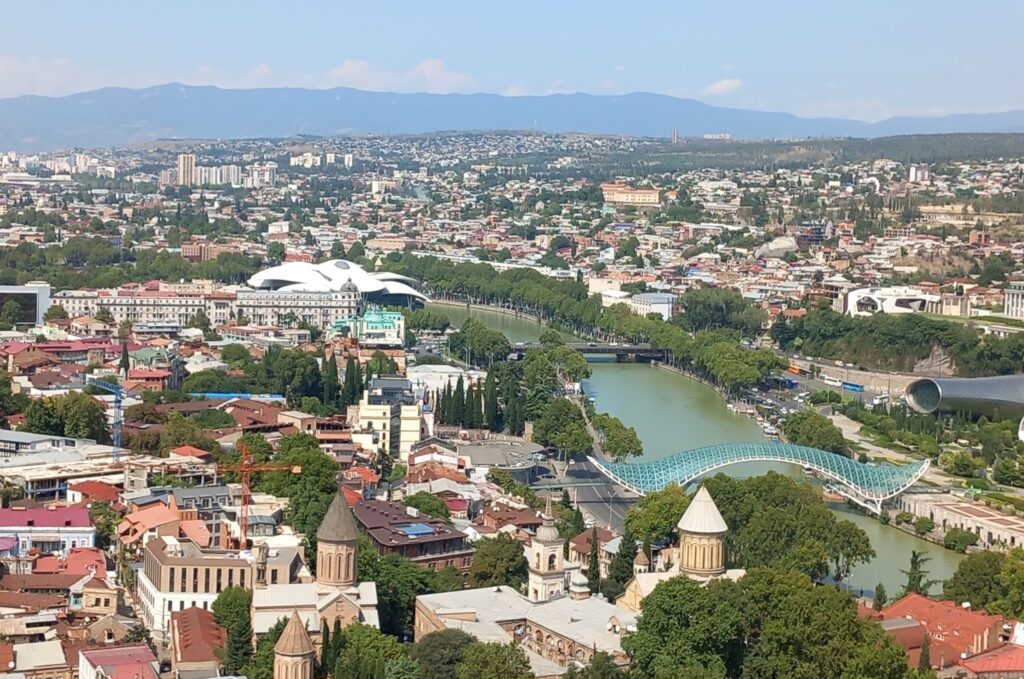The number of travelers in the All Other Passports queue shocked me. Staggering off my flight from Munich at five in the morning, the last thing I needed to see was a swarm of people anxious to get through passport control and into Tbilisi. But I did. More than one flight had arrived at that same hideous hour, and – visible evidence of Georgia’s growing popularity – the impatient crowd of foreigners was at least double that of citizens returning to their country.
Georgia (the country, not the US state) is getting attention as a popular digital nomad destination. I picked this up in passing when I did some fact-finding online about the place. But now on the ground, I see it’s just plain popular. Period. I had no preconceptions about the country, no specific expectations. The idea of visiting Georgia had entered my consciousness when I had a delicious and boozy meal in a Georgian restaurant in Moscow, capital of the Soviet Union at that time – sadly, it was that long ago. Now that I’ve finally got around to it, all I really had in mind was to go to a place a bit more exotic than what’s on offer in the European Union and relive a bit of what I had enjoyed in Moscow all those years ago – but the real deal, straight from the source.
Once I had escaped the oddly last-outpost-like experience of Tbilisi airport, I settled into a comfortable car arranged via Bolt headed to a Hilton (something familiar after the inevitable trauma of modern-day air travel). Free-ranging horses grazed, one colt suckling from its mother, beside the road leading out of the airport (I looked twice for a fence without seeing one). It had a surreal early-morning beauty to it that touched me. There was no traffic on the smooth highway leading toward Tbilisi. My Bolt driver drove the 17 kilometers into the city without hurry as I watched the sun appear over the surrounding hills. It was a meandering route with a couple of road closures monitored by policemen that led to a dilapidated and graffitied part of town and clearly not my Hilton. A few anxious minutes followed (he asked me if I was a tourist, and when I said, yes, this seemed to be the right answer). After some adjustment to his phone navigation, it turned out we were about 200 meters from the hotel.
After the roaming horses, I noticed the dogs. There were countess strays along my route to the hotel. Many occupied surprisingly dangerous spots, often at the very edge of fast-moving traffic, always individually, like a homeless person who has staked a claim. Others wandered sluggishly but with street-smart confidence. Later in the day, taking a walk after lunch and a nap, I saw only a fraction of the number I had seen on my way into town.
These animals never gave me pause, however. I’ve seen forlorn strays in other countries. You can recognize their misery in an instant. This was different. The dogs seemed as safe and secure as the elderly women out at first light sweeping the streets and sidewalks. Maybe it was my over-tired brain making absurd connections, but I saw something reassuring in the continuity of the street-sweepers and the strays, a kind of complicated but hopeful progression from Soviet times to now. While the women, who have never known any other way, continue to sweep, signs of rapid modernization surround them, including (and I would later discover this to be true) the organized care of the strays.
I received a warm welcome when I arrived at the hotel. Although I wasn’t able to check in for another two hours, I was served coffee, and, after I checked in, the manager picked up the tab for my breakfast. After a hot shower and some sleep, I had recovered.
Out on Chavchavadze Avenue – a newer side of town growing rapidly with high-rise construction – I felt an endorphin-like rush of contentment. I was surrounded by polite and friendly people. So far, every interaction with a Georgian had been pleasant and welcoming. Naturally, as the day wore on, I encountered a few Soviet throwbacks, a kind of grouchiness that is hard to interpret, the kind I habitually explain away as communist-related – a long post-Soviet shadow. Maybe it’s just reflexive, an I-don’t-want to-deal-with-someone-who-doesn’t-speak-my-language reaction. The kind of thing that could hopefully be solved with polite-sounding words and smiles. It will take decades to eradicate that mentality (assuming it is Soviet-induced), if it can ever be eradicated. And maybe it never will be. Maybe it’s cultural, although my initial feeling is not to believe that. Georgians seem kind, ready to help if you need it: they are welcoming hosts to courteous visitors.
Overall, my first impression of Tbilisi is of a tidy capital city filled with relaxed citizens going about their Thursday in a congenial way, without rush, without cars and motorcycles screaming down the streets and avenues to the sound of blaring horns and scattered police sirens, without the frantic high-pitched drone of countless mopeds, without the bustle of so many self-important people compelled to convey to the world that they have somewhere to be – more San Francisco than LA, atmosphere-wise; more Boston than NYC. But Tbilisi is too unique for such cheap comparisons. It’s a city that’s been around for centuries and evolves like it was built yesterday. Georgians are justifiably proud of their city, their heritage; they want to share with visitors what they’ve got. I go to sleep tonight looking forward to their generosity.
